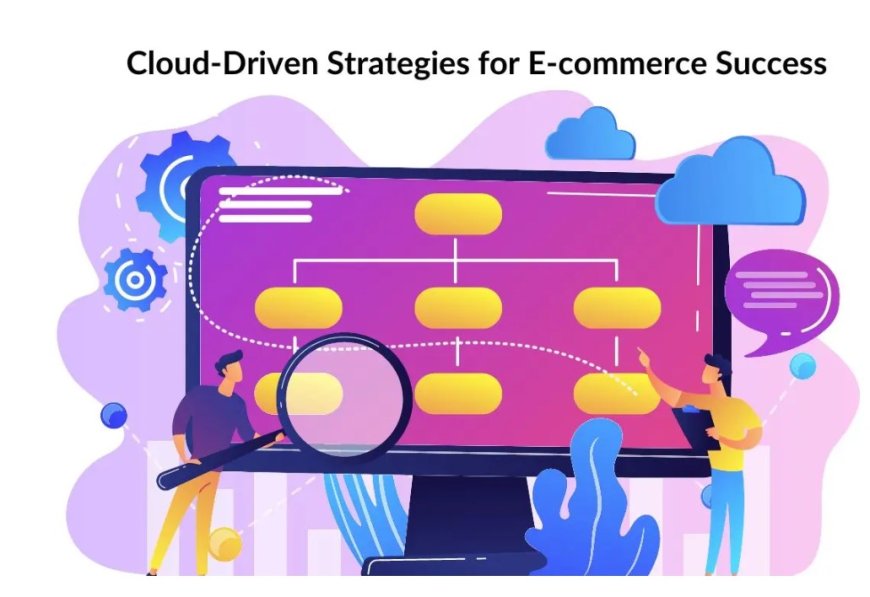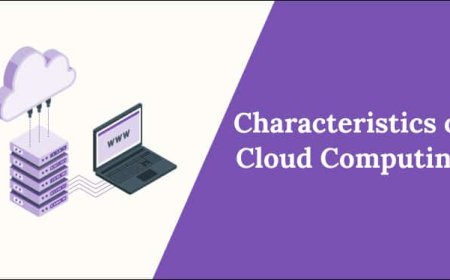Cloud Computing for E-commerce: Scaling for Success
Learn about cloud computing for e-commerce and discover strategies to scale your online business for success. Explore keywords, infrastructure, best practices.

E-commerce has become the cornerstone of retail success. As online businesses grow and customer demands increase, scalability becomes a critical factor in ensuring sustained growth and competitive advantage. Cloud computing has emerged as a game-changer for e-commerce enterprises, providing the necessary infrastructure and resources to scale efficiently and achieve success. This explores how cloud computing empowers e-commerce businesses to scale seamlessly, optimize operations, and deliver exceptional customer experiences.
Cloud computing For E-commerce
Cloud computing has revolutionized the e-commerce industry, providing businesses with the tools and infrastructure needed to scale and succeed in a competitive digital landscape. The flexibility and elasticity of cloud solutions enable e-commerce platforms to handle fluctuating demands, ensuring seamless performance even during peak traffic times. It significantly reduces infrastructure costs, allowing businesses to allocate resources to critical areas such as customer experience and product development. Cloud-based security measures offer robust protection for sensitive customer data, instilling trust and confidence among online shoppers. Additionally, cloud computing facilitates real-time inventory management, personalized customer experiences, and seamless mobile commerce, empowering businesses to deliver exceptional service and stay ahead of customer expectations. Embracing cloud computing is no longer an option but a necessity for e-commerce enterprises aiming to achieve sustainable growth and success in the digital age. With the cloud as their strategic partner, e-commerce businesses can unlock new levels of efficiency, innovation, and customer satisfaction, driving their businesses to new heights in the global e-commerce market.
Elasticity for Fluctuating Demands
E-commerce websites often experience fluctuating demands, especially during peak seasons and promotional events. Traditional on-premises infrastructure may struggle to handle sudden spikes in traffic, leading to slow load times and potential downtime. Cloud computing offers the advantage of elasticity, where resources can be automatically scaled up or down based on demand. This flexibility ensures that e-commerce websites can handle high traffic volumes without compromising on performance, providing a seamless shopping experience to customers.
Reducing Infrastructure Costs
Reducing infrastructure costs is a critical benefit of adopting cloud computing for e-commerce businesses. Traditional on-premises infrastructure requires significant capital investments and ongoing maintenance expenses, which can be burdensome for growing businesses. Cloud computing offers a pay-as-you-go model, allowing businesses to access computing resources on-demand and pay only for what they use. This cost-effectiveness enables e-commerce enterprises to allocate resources more strategically, directing funds towards core business activities such as marketing, product development, and customer service. By eliminating the need for physical servers and maintenance overhead, cloud computing allows e-commerce platforms to scale efficiently while maintaining financial flexibility, making it an indispensable tool for long-term success in the competitive e-commerce landscape.
Geographic Reach and Faster Load Times
Geographic reach and faster load times are crucial factors in delivering a seamless and satisfactory user experience in the highly competitive world of e-commerce. Cloud computing has emerged as a powerful solution to address these challenges. With data centers distributed globally, cloud service providers offer a content delivery network (CDN) that optimizes the distribution of website content to users based on their geographical location. This results in reduced latency and faster load times, ensuring that e-commerce platforms can cater to customers worldwide with minimal delays. By leveraging cloud-based CDNs, e-commerce businesses can enhance their website's performance, boost user engagement, and increase conversion rates. Ultimately, geographic reach and faster load times empower e-commerce enterprises to compete effectively in the global marketplace, providing a seamless shopping experience that keeps customers coming back for more.
Improved Security and Data Protection
Improved security and data protection are critical advantages that cloud computing offers to e-commerce businesses. With the increasing threat of cyberattacks and the need to protect sensitive customer information, cloud service providers invest heavily in robust security measures. Through encryption, access controls, and regular security updates, cloud computing platforms ensure that e-commerce data remains safeguarded from unauthorized access and breaches. Additionally, cloud providers offer data backup and disaster recovery services, enabling businesses to quickly recover from potential data loss or system failures. Embracing cloud computing not only enhances the security posture of e-commerce platforms but also fosters customer trust and confidence, making it a vital aspect of modern e-commerce operations.
Agility and Innovation
Agility and innovation are the driving forces behind the successful adoption of cloud computing in the e-commerce industry. The scalability and flexibility offered by cloud-based solutions empower e-commerce businesses to adapt swiftly to changing market conditions and customer demands. With the ability to experiment and deploy new features rapidly, cloud computing fosters a culture of innovation that enables businesses to stay ahead of the competition. The data-driven insights derived from cloud analytics facilitate customer personalization, enhancing engagement and loyalty. As e-commerce enterprises embrace cloud computing, they can focus on continuous improvement, seamless integration, and delivering exceptional customer experiences, thus solidifying their position as leaders in the ever-evolving digital landscape.
Seamless Integration with Third-Party Tools
Seamless integration with third-party tools is a key advantage that cloud computing brings to e-commerce businesses. The cloud offers a flexible and agile environment, enabling e-commerce platforms to effortlessly integrate with a wide range of third-party applications and services. This integration enhances operational efficiency, streamlines processes, and fosters a cohesive ecosystem of tools and services. From payment gateways and inventory management systems to customer relationship management (CRM) platforms, the cloud facilitates smooth data flow and communication between various tools. This cohesive integration empowers e-commerce businesses to deliver a superior shopping experience, optimize operations, and drive customer satisfaction. By harnessing the power of cloud computing to seamlessly collaborate with third-party tools, e-commerce enterprises can stay competitive, agile, and responsive in the ever-evolving world of online retail.
Cloud computing has become an indispensable asset for e-commerce businesses aiming to scale for success. Its elasticity, cost-effectiveness, and geographic reach provide the foundation for a robust and responsive e-commerce infrastructure. By leveraging cloud services, e-commerce enterprises can meet fluctuating demands, optimize their operations, and deliver exceptional customer experiences. Embracing cloud computing empowers businesses to focus on innovation, security, and customer satisfaction, paving the way for sustainable growth and long-term success in the dynamic world of online retail. As the e-commerce landscape continues to evolve, cloud computing will remain an essential tool in driving growth and ensuring a competitive edge in the global marketplace.




























































